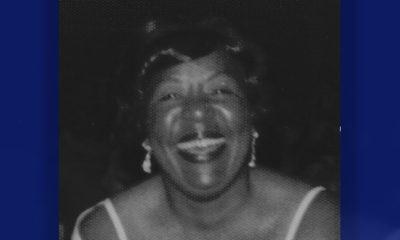Entertainment
Maine Man to Explore Final Resting Places of Poets in South

In this Thursday, May 28, 2015 photo, an Edgar Allan Poe bobble-head rests on the dashboard of a utility van dubbed “Dedgar the Poemobile,” driven by its owner, Dead Poets Society of America founder Walter Skold, left, in Freeport, Maine. Skold will take the van on a 16-state, 10-week tour to document the final resting places of 90 poets in the Deep South. (AP Photo/David Sharp)
David Sharp, ASSOCIATED PRESS
FREEPORT, Maine (AP) — A former teacher who travels the country to document the final resting places of poets is looking forward to calling attention to African-American poets on a tour of the South and elsewhere.
Black poets have been writing about injustice and hardship since the days of slavery, and the theme rings true today, given the recent unrest surrounding police killings of black men, Walter Skold said.
“African-American poets have been going through the same turmoil. They’ve been right there. They’ve chronicled the great sorrows and successes that African-Americans have had,” he said.
Skold, who is the founder of the Dead Poets Society of America, intends to reach a milestone of the 500th grave during the 16-state, 10-week pilgrimage, which kicks off Saturday in Baltimore at the grave of Edgar Allan Poe before moving into the South. For the trip, he’s visiting 90 graves, including those of 47 state poets laureate across the region.
Fifteen African-American poets include Albery Whitman, who was born a slave, spoke out against the treatment of the Seminoles in Florida and was dubbed the “poet laureate of the Negro race.” He’s buried in Atlanta.
Others include Arna Bontemps, a Louisiana-born poet who was part of the Harlem Renaissance and is buried in Nashville, Tennessee; Robert Charles Benjamin, who’s buried in Lexington, Kentucky, where he was shot in 1900 while trying to get blacks to register to vote; and Melvin Tolson, Liberia’s poet laureate, buried in Guthrie, Oklahoma.
One of the more offbeat poets is Sun Ra, who’s better known as a musical composer and performer who espoused a “cosmic philosophy” and claimed to be from Saturn. He’s buried in his home state in Birmingham, Alabama.
Jericho Brown, who leads poetry workshops at Emory University in Atlanta, said there’s a diversity of viewpoints and experiences among black poets that defies any single narrative. But there are cultural influences, like Missouri-born Langston Hughes’ use of the rhythms of jazz and blues in his poetry, he said.
“Being black affords you the opportunity to see things that others might not be able to see, to give you experiences that others may not have,” Brown said.
Skold, 54, of Freeport, is a poet himself. He travels in a souped-up box van dubbed “Dedgar the Poemobile,” with a whimsical portrait of Poe on the side, solar panels on the roof and a single bed inside. When he’s done with this trip, he plans to finish a documentary, “Finding Frost: Poets and The Graves.”
He sometimes sleeps in graveyards to get the best light for photographs and video that he uses to document the graves. But he says he has never communed with the ghosts or spirits of bards.
“I feel a connection to the poets, but it’s a historical one,” he said. “The whole nature of my project has become celebratory. It’s not something that I see as morbid at all.”
His adventures were nearly cut short in 2010, when he suffered a heart attack in New Jersey after visiting Walt Whitman’s grave.
After a hospital stay in Princeton, he traveled to the nearby grave of Henry van Dyke, author of the poem that begins, “Joyful, joyful, we adore thee,” to play his harmonica and offer a prayer of thanks that he’s not yet a dead poet.
___
Follow David Sharp on Twitter at https://twitter.com/David_Sharp_AP
The story has been corrected to restore dropped word in a quote from Jericho Brown to say: “Being black affords you the opportunity to see things that others might not be able to see, to give you experiences that others may not have.”
Copyright 2015 The Associated Press. All rights reserved. This material may not be published, broadcast, rewritten or redistributed.
###
Activism
Oakland Post: Week of December 10 – 16, 2025
The printed Weekly Edition of the Oakland Post: Week of – December 10 – 16, 2025

To enlarge your view of this issue, use the slider, magnifying glass icon or full page icon in the lower right corner of the browser window.
Alameda County
Seth Curry Makes Impressive Debut with the Golden State Warriors
Seth looked comfortable in his new uniform, seamlessly fitting into the Warriors’ offensive and defensive system. He finished the night with an impressive 14 points, becoming one of the team’s top scorers for the game. Seth’s points came in a variety of ways – floaters, spot-up three-pointers, mid-range jumpers, and a handful of aggressive drives that kept the Oklahoma City Thunder defense on its heels.

By Y’Anad Burrell
Tuesday night was anything but ordinary for fans in San Francisco as Seth Curry made his highly anticipated debut as a new member of the Golden State Warriors. Seth didn’t disappoint, delivering a performance that not only showcased his scoring ability but also demonstrated his added value to the team.
At 35, the 12-year NBA veteran on Monday signed a contract to play with the Warriors for the rest of the season.
Seth looked comfortable in his new uniform, seamlessly fitting into the Warriors’ offensive and defensive system. He finished the night with an impressive 14 points, becoming one of the team’s top scorers for the game. Seth’s points came in a variety of ways – floaters, spot-up three-pointers, mid-range jumpers, and a handful of aggressive drives that kept the Oklahoma City Thunder defense on its heels.
One of the most memorable moments of the evening came before Seth even scored his first points. As he checked into the game, the Chase Center erupted into applause, with fans rising to their feet to give the newest Warrior a standing ovation.
The crowd’s reaction was a testament not only to Seth’s reputation as a sharpshooter but also to the excitement he brings to the Warriors. It was clear that fans quickly embraced Seth as one of their own, eager to see what he could bring to the team’s championship aspirations.
Warriors’ superstar Steph Curry – Seth’s brother – did not play due to an injury. One could only imagine what it would be like if the Curry brothers were on the court together. Magic in the making.
Seth’s debut proved to be a turning point for the Warriors. Not only did he contribute on the scoreboard, but he also brought a sense of confidence and composure to the floor.
While their loss last night, OKC 124 – GSW 112, Seth’s impact was a game-changer and there’s more yet to come. Beyond statistics, it was clear that Seth’s presence elevated the team’s performance, giving the Warriors a new force as they look to make a deep playoff run.
Activism
Oakland Post: Week of November 26 – December 2, 2025
The printed Weekly Edition of the Oakland Post: Week of November 26 – December 2, 2025

To enlarge your view of this issue, use the slider, magnifying glass icon or full page icon in the lower right corner of the browser window.
-

 Activism4 weeks ago
Activism4 weeks agoOakland Post: Week of November 12 – 18, 2025
-

 Activism3 weeks ago
Activism3 weeks agoIN MEMORIAM: William ‘Bill’ Patterson, 94
-

 Activism4 weeks ago
Activism4 weeks agoHow Charles R. Drew University Navigated More Than $20 Million in Fed Cuts – Still Prioritizing Students and Community Health
-

 Bay Area4 weeks ago
Bay Area4 weeks agoNo Justice in the Justice System
-

 #NNPA BlackPress3 weeks ago
#NNPA BlackPress3 weeks agoBeyoncé and Jay-Z make rare public appearance with Lewis Hamilton at Las Vegas Grand Prix
-

 #NNPA BlackPress3 weeks ago
#NNPA BlackPress3 weeks agoLewis Hamilton set to start LAST in Saturday Night’s Las Vegas Grand Prix
-

 Activism3 weeks ago
Activism3 weeks agoOakland Post: Week of November 19 – 25, 2025
-

 #NNPA BlackPress4 weeks ago
#NNPA BlackPress4 weeks agoThe Perfumed Hand of Hypocrisy: Trump Hosted Former Terror Suspect While America Condemns a Muslim Mayor














































